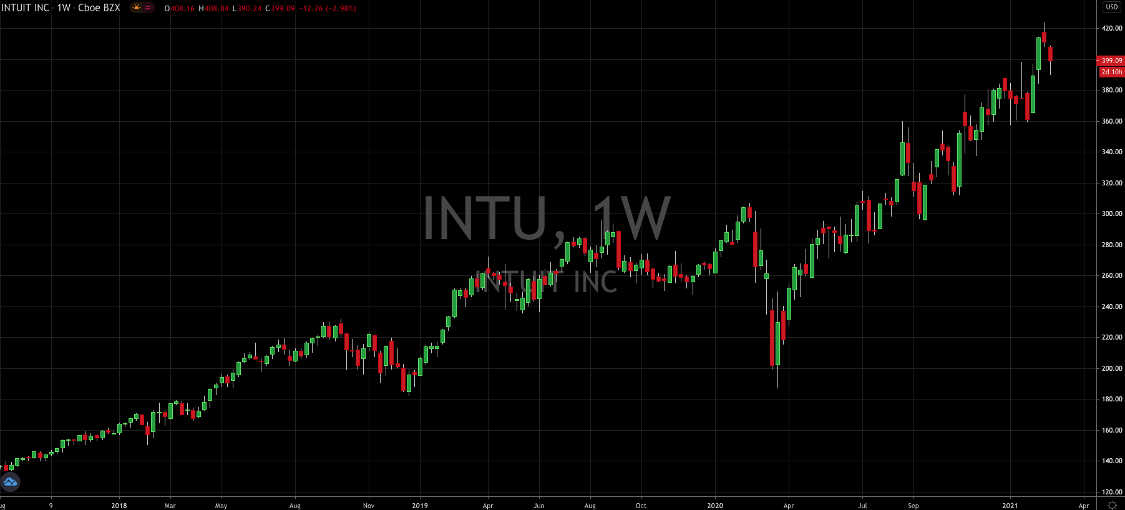Financial and tax software giant Intuit (
NASDAQ: INTU) reported its fiscal Q2 earnings after yesterday’s close. Both the headline numbers and the stock’s performance in after-hours trading suggest it was a bit of a mixed bag
if not an actual disappointment.
GAAP EPS came in at $0.07, $0.05, or 41%, lower than what analysts were expecting. Revenue was also light compared to the consensus and posted a contraction of 7% on the year. There were some promising signs, however, with revenue from QuickBooks Online Accounting and Online Services jumping around 20% each. Total international online revenue jumped 44% which bodes well for the future.
A few eyebrows were raised at the Consumer Sales number, which was down more than 70% on the year. This contraction was largely responsible for the dip in the topline number but looks to be nothing more than a temporary blip, with the COVID driven delayed tax filing window pinpointed as the main culprit. The company had warned investors of this already earlier this month when they cut their Q2 estimates and they’re expecting a fairly quick return to normal. Case in point, for the full year 2021, the company is already forecasting total revenue growth of between 15-17%.
Bullish Prospects
Indeed Intuit’s CEO, Sasan Goodarzi, struck a bullish tone with the report when he said; "we continue to see strong momentum and accelerating innovation across the company with our A.I.-driven expert platform strategy. Small Business and Self-Employed Group delivered double-digit revenue growth and Credit Karma performed very well since we completed the acquisition in December. We are encouraged by our early results this tax season, and we are confident in our game plan to win."
Credit Karma was a 2020 acquisition and the fact that it’s up and running having only been fully finalized in early December is quite bullish. It was reported to have brought in $144 million in revenue since then already. For all that though, shares still found themselves down in the after hours session and were down close to 3% in pre-market trading on Wednesday.
Investors thinking about getting involved should find this, and any further dip, appealing. Intuit is still a $100 billion tax behemoth that owns consumer software staples like TurboTax as well as small business software staples like QuickBooks Online. Towards the end of last year Morgan Stanley, Piper Sandler, and Guggenheim all reiterated their Buy ratings and raised their price targets to upwards of $455, suggesting long-term potential and upside of some 13% from Tuesday’s closing price.
Getting Involved
A surprise earnings miss can sometimes be a blessing in disguise, particularly when it’s easily explained, as is the case here. Intuit has rallied by as much as 120% since last March for a very good reason. A wave of digitization has swept the country and more people and companies than ever are moving their financial operations online. As the go-to cloud-based accounting software for many in both markets, Intuit is well-positioned to capitalize on this shift. Dan Loeb’s famous Third Point fund went so far as to recently increase their stake in the company.
Having come through the pandemic to hit fresh all-time highs earlier this month, Intuit can also look forward to a post-pandemic economy that sees a resurgence in small and medium businesses which makes up most of their core market. Taxes aren’t going anywhere and with that in mind, the future is bright for tax software names. Any further profit taking in Intuit shares in the near term should be viewed as a buying opportunity into a US tech stalwart.

Before you consider Intuit, you'll want to hear this.
MarketBeat keeps track of Wall Street's top-rated and best performing research analysts and the stocks they recommend to their clients on a daily basis. MarketBeat has identified the five stocks that top analysts are quietly whispering to their clients to buy now before the broader market catches on... and Intuit wasn't on the list.
While Intuit currently has a Moderate Buy rating among analysts, top-rated analysts believe these five stocks are better buys.
View The Five Stocks Here
Enter your email address and we'll send you MarketBeat's list of seven stocks and why their long-term outlooks are very promising.
Get This Free Report
Like this article? Share it with a colleague.
Link copied to clipboard.